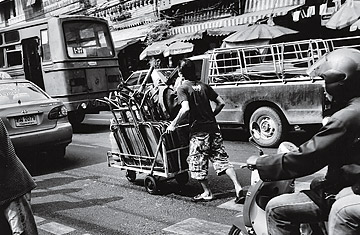
Cyclists and motorist on the streets of Bangkok, Thailand circa March, 2008.
(2 of 2)
With Thailand's economy predicted to rebound this year--ironically, a booming auto industry gets some of the credit--the congestion will probably only get worse. The one thing that has gotten better is air quality. Even a decade ago, working as a Bangkok traffic cop was considered hazardous because of the constant inhalation of exhaust fumes. Since then, the city has cleaned up. The amount of harmful small particulates in the air has decreased nearly 50%, in part because of a campaign to switch cars and buses from diesel to natural gas. That doesn't mean that the streets are pristine: only seven of the 60 so-called green roads in Bangkok were found to have safe air, according to a survey last year by the Bangkok Metropolitan Administration.
For traffic to really improve, Bangkok will have to rely on a political bureaucracy that is, if anything, even more clogged than the city's streets. Each one of the seven governments in power over the past 15 years has come in promising to overhaul Bangkok's mass-transit system with dedicated bus lanes, railway extensions and park-and-ride facilities. Then, invariably, another group of leaders takes over and scraps the predecessors' plans. After the last coup, in 2006, the ruling military junta spent a year whittling down the previous government's $15 billion public-transportation plan, arguing that it was too costly. The generals approved a more modest rail-network expansion last October. Elections two months later ushered in a new Prime Minister, Samak Sundaravej, who unveiled one more rail proposal in February. A former Bangkok governor who knows the city's traffic woes firsthand, Samak is calling for nine rail lines to be built within four years, at a cost of $16 billion.
That could be another white elephant. There's also the matter of real ones. A few weeks ago, I was stuck in a taxi in a traffic jam that seemed so normal that I didn't even bother to see what was delaying us. Finally I glanced up. In front of us, wandering the wrong way through three lanes of stalled cars and trucks was a disconsolate pachyderm, its trunk held high to avoid breathing exhaust fumes. Bringing elephants to Bangkok is illegal. But the beast's handler was willing to risk a fine if it meant coaxing a few bananas and baht out of tourists. And what's a little more traffic in a city where gridlock is a way of life?